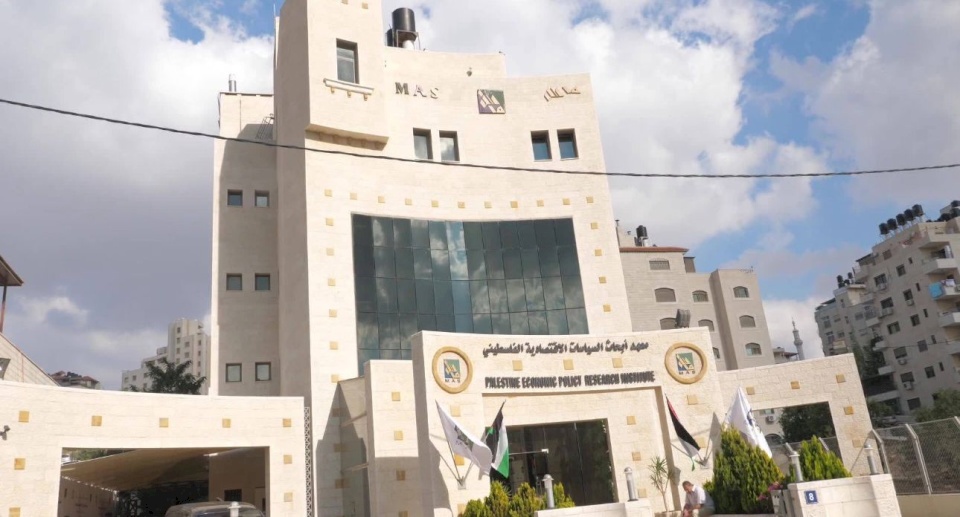
"MAS" presents policies to reduce Israeli financial measures and the shekel surplus crisis
SadaNews - The Palestinian Economic Policy Research Institute "MAS" has issued a policy brief summarizing the study "Palestinian Options to Mitigate the Effects of Israeli Punitive Financial and Banking Measures: A Reference and Policy Study." This study focuses on a number of key axes related to the Palestinian banking system, its relations with the Israeli entity, and ways to mitigate Israeli restrictions on the Palestinian economy, particularly regarding the cessation of correspondent banking operations, and the issue of the accumulating shekel.
The study reviews the problem of the shekel surplus and its causes, which has exceeded 6% of the total value of short-term deposits in shekels. According to the Paris Economic Agreement, this cash surplus in shekels must be returned to the Israeli central bank, as it is the bank that issues the shekel currency. This surplus accumulates in the Palestinian banking system without yielding any benefit, causing losses to banks due to storage, insurance, and protection costs. A report by the International Monetary Fund (2022) estimated that the total costs incurred by Palestinian banks for holding shekel surpluses lead to a 20% reduction in their profits.
Despite the continued influx of shekels throughout 2023, the shekel still constitutes about 85% of total cash liquidity in the Palestinian banking system and about 22% of the banking sector's assets in shekels (valued in dollars). The deposits of Israeli shekels during the same year amounted to about 45.8% of the total deposits in the banking system and about 45% of the size of credit facilities. The study shows that the sources of accumulated shekels in Palestinian banks are Palestinian labor in Israel, purchases by Palestinians from inside and Jerusalem from the Palestinian areas, financial inclusion that contributes to increasing shekel deposits in Palestinian banks, and the informal economic sector, which is estimated to contribute 22% to the GDP, in addition to Palestinian exports (86% to Israel).
The study also examines scenarios regarding banking relationships, concluding with two scenarios: the first being the continuation of the status quo, characterized by uncertainty and restrictive Israeli policies, and continued Israeli control in obstructing the absorption of the shekel surplus and restricting correspondent banking operations; and the second being the severance of banking relations, which will lead to the end of correspondent banking operations. The study indicates that both scenarios have clear negative impacts on banking, economic, and trade relationships, as illustrated in the sections related to these scenarios.
The study shows that the repercussions of the shekel surplus crisis are not limited to banks but extend to encompass the entire national economy. The shortfall of Palestinian banks' deposits in Israeli correspondent banks may render these banks unable to finance Palestinian traders' imports of goods from Israeli merchants, leading to a complete disruption of supply chains.
In his comments, the Director-General of the Institute, Mr. Raja Khalidi, emphasized that the study presents several recommendations that could mitigate the effects of the shekel accumulation crisis, particularly in expanding the application of electronic payment methods similar to the E-Sadad digital platform used for bill payments at the national level and encouraging the payment of wages for Palestinian workers in the Israeli economy through banking channels. Additionally, it advocates for expanding electronic payment practices for purchases made by Palestinians from inside Jerusalem from the West Bank. He called for studying the possibility of the Ministry of Finance intensifying financial policy tools and increasing government spending in times of economic recession.
Khalidi indicated that the study recommends encouraging citizens to purchase electric vehicles, which reduce the fuel bill that is one of the main sources of the shekel surplus. It also insists on overcoming the obstacles hindering Palestinian electricity distribution companies from encouraging the private sector and homeowners to invest in clean energy projects, significantly reducing shekel flows allocated to electricity payments. He also called for establishing a national fund to manage the shekel surplus, which would serve as a temporary mechanism to internally circulate liquidity and provide short-term facilities for small and medium-sized enterprises through financial tools like currency notes from the central bank or local bonds. It emphasized the need to expand the powers of Palestinian banks in using financial derivatives (such as futures contracts, options contracts, and swaps) as hedging tools within global markets, to mitigate risk impacts.
Khalidi noted that the study calls on the central bank to take immediate actions to support liquidity and banking stability by issuing short-term investment instruments (foreign currency notes) to attract surplus liquidity in dollars and dinars, along with a temporary exemption for dollar and dinar deposits from some mandatory reserve requirements to encourage the attraction of hard currencies, promoting banks to offer shekel facilities to facilitate liquidity movement and alleviate pressure on the shekel surplus, and granting immediate flexibility to the central bank by temporarily lowering required reserve ratios in case of any financial emergency.
Finally, it must be emphasized that these obstacles arise from political dimensions that cannot be resolved fundamentally except through diplomatic and political channels, the first of which is obliging Israel to implement the provisions of the Paris Economic Agreement.

The Problem of Shekel Overcrowding Worsens.. Fuel Station Owners Threatened with Closure o...

The Palestinian Economy at a Crossroads: 4 Files Awaiting Resolution

Currency Exchange Rates Against the Shekel (January 23)

Hebrew Newspaper: Israel Is Still Delayed in the Rollout of 5G Technology

Increase in Exports and Imports in November 2025 and Rise in Trade Deficit to $519.4 Milli...

Currency Exchange Rates Against the Shekel on Thursday (January 22)

Al-Akhr: We strive to implement governance instructions to ensure fairness for small inves...
